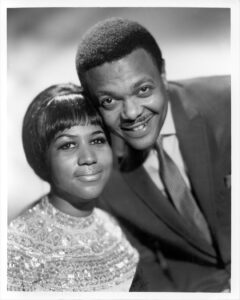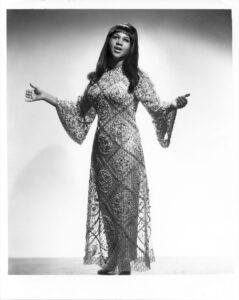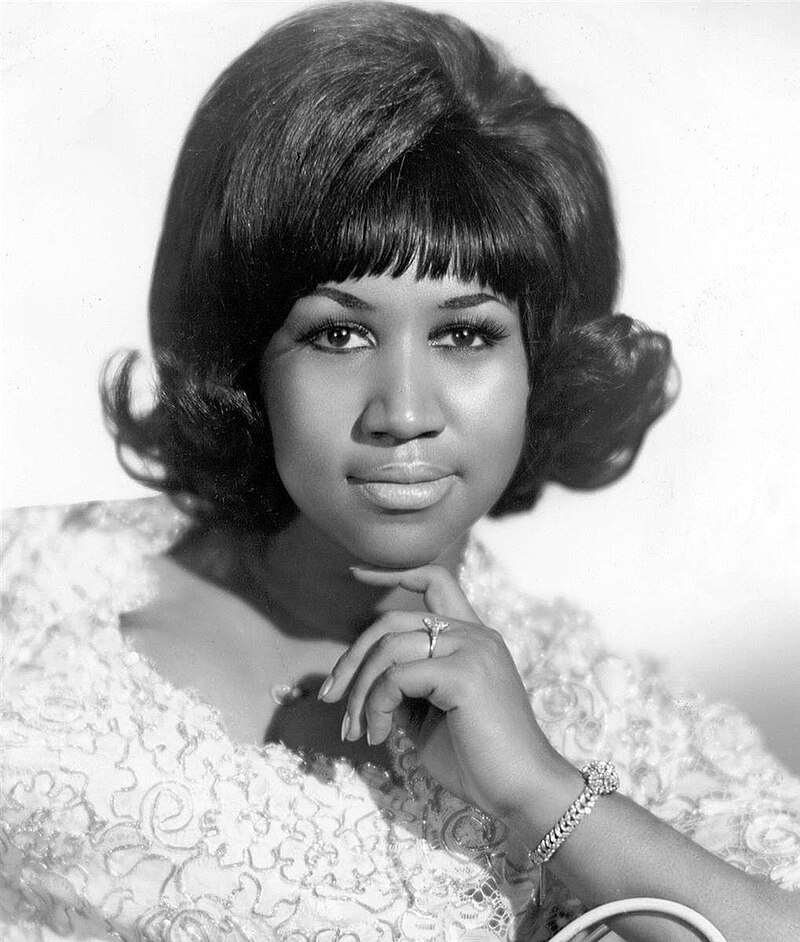BIOGRAPHY:
Aretha Louise Franklin is an American singer who performed songs in the styles of rhythm and blues, soul and gospel. For her powerful and flexible vocals, she was dubbed the Queen of Soul, or Lady Soul. In her success, she was not inferior to either Freddie Mercury or Whitney Houston: in 1987, Aretha became the first woman whose name was inducted into the Rock and Roll Hall of Fame, and in 2008, Rolling Stone magazine named her the greatest singer in history.
Childhood and youth:

Aretha Franklin was born on March 25, 1942 in Memphis, Tennessee, the daughter of a priest and a nurse. Her father Clarence was an excellent speaker, and her mother Barbara was a kind and loving woman, but the relationship in the family did not work out. Aretha’s parents constantly quarreled, and eventually, when the girl was six years old, they divorced. The Franklin family then lived in Detroit, Michigan. Not wanting to stay in an unloved city, Barbara left her two daughters and three sons with her husband and left for New York.
At the age of 10, little Aretha discovered her talent for singing. Her father, noticing this, brought the girl to the church choir. The child’s voice, which was not yet strong, attracted people from all over the city. Clarence was a master of his craft and preached heartfelt sermons, but it was said that the crown jewel of The Bethel Baptist Church was Aretha.
In 1956, Franklin performed the “Dear Lord” prayer in front of 4,500 parishioners. She was 14 years old then. The gospel surprised and amazed the producer of JVB Records, and he decided to give the girl the opportunity to record her debut album. It was called Songs of Faith. The record was recorded during a performance by a church choir. It included nine compositions. This album was later reissued several times. From this recording, the career of the future superstar was supposed to take off, but young Aretha brought home the news – she was pregnant. By the age of 17, she was already raising two sons and was expecting a third. In 1959, Franklin decided that she would not trade her talent for life as a single mother. She left the children in the care of their father and set off to conquer New York.
Music:

Having moved to the Big Apple, Aretha Franklin immediately got down to business – she sent out a demo recording of The Gospel Soul of Aretha Franklin (a studio reissue of Songs of Faith) to several companies. All the labels were delighted with her powerful voice, but offers came from only three. As a result, Aretha made a choice in favor of Columbia Records, where John Hammond worked, the producer who gave birth to Bob Dylan, Bruce Springsteen, Billie Holiday and others. The choice, as time has shown, was not entirely successful: yes, Columbia Records won the right to promote the young singer , but they did not know how to properly use her talent. Instead of allowing the girl to choose her own style, the producers assigned her the status of a pop singer.
Ultimately, ten albums recorded between 1960 and 1966 were called dry by music critics and the songs were described as labored. They did not go unnoticed in the charts, but sold in modest quantities. The Unforgettable record turned out to be relatively popular – a tribute dedicated to Aretha’s favorite singer Dinah Washington. Franklin once noted in an interview:
“I first heard Dina when I was still a child. I never met her in person, although she and my father were good friends. I always wanted to record something in her honor. I didn’t try to imitate her unique style, I just sang her songs the way my heart felt them.”
In 1966, the contract with Columbia Records expired, and then Atlantic Records producer Jerry Wexler lured Aretha Franklin to his place. Thanks to his insight, the singer began performing soul music again.
Wexler had high hopes for the young star and planned to record several blues records in the Music Emporium studio. Aretha’s rich vocals were proposed to be complemented by the music of Eric Clapton, Duane Allman and Kissy Houston. However, life decided differently again.

During one of the studio sessions, Franklin’s then-husband and part-time manager Ted White started a drunken fight with one of the musicians. This forced Wexler to close the studio door in the singer’s face. The only composition that was completed was I Never Loved a Man (the Way I Love You).
Unexpectedly for Aretha, it became a hit. This convinced the girl to finish the album at all costs. In 1967 the record was ready. She rose to second place on the national chart and topped the list of the best “black” albums. Finally, there was a breakthrough in the biography of the Queen of Soul. From 1966 to 1970, she released ten more records, including Lady Soul in 1968. In 2003, Rolling Stone magazine ranked the album number 84 on its list of the “500 Greatest Albums of All Time.”
A striking hit was the composition Respect, the first performer of which was Otis Redding. The song became the unofficial anthem of the feminist movement, and Aretha herself became the face of black women. The composition also brought Franklin her first Grammy awards – for best recording and for best female vocal in the genre of rhythm and blues.
This surge in popularity was followed by a decline; in the 70s, Aretha Franklin’s name appeared less and less on the charts. In addition, in 1984, the artist’s father died, the divorce proceedings with her second husband Glynn Theremin were completed, and she finally gave up.
A lifeline comes from filming The Blues Brothers, a film about men who revive an old blues band to earn money to save the orphanage where they once grew up. Along with Aretha, Ray Charles, James Brown and others appear in the frame. Franklin shows herself to be a good actress, and in 1998 she starred in the sequel “Blues Brothers 2000”.
Over time, Aretha Franklin loses interest in solo albums and creates creative duets. Thus, the song I Knew You Were Waiting, recorded in 1986 with George Michael, rises to the first line of the Billboard Hot 100. After such success, the singer records compositions with Christina Aguilera, Gloria Estefan, Mariah Carey, Frank Sinatra and others. At the same time, she does not stop giving concerts, and uses videos from performances as clips.
Success:

In the late 60s, the whole world was talking about Aretha – her 10 songs constantly occupied high positions on the charts, in particular, “Chain of Fools”, “(You Make Me Feel Like) A Natural Woman”.
The most famous song in her extensive repertoire was the single “Respect”. Written and first performed by soul singer Otis Redding, Franklin’s interpretation of the song became an anthem for the growing feminist movement in America. She received two Grammy awards for this song.
Aretha Franklin – Respect (listen online)
During the 1960s, Franklin, who at the time received the honorary unofficial title of “Lady Soul,” became the face of the civil rights movement.

In 1968, Martin Luther King presented her with a special award that recognizes young leaders in the human rights movement. At the same time, she became only the second African-American woman whose face was featured on the cover of Time magazine. Until the late 70s, Aretha was one of the most popular performers in America. Although her popularity waned in the late 70s, Franklin had already become a legend.
Franklin’s last major chart success was her cover of Stevie Wonder’s “Until You Come Back to Me.”
A total of 112 of her songs have charted on the Billboard charts, with 77 of them in the top 100. The star has won 21 Grammy Awards and sold more than 75 million copies of her albums. Aretha Franklin takes first place in Rolling Stone magazine’s list of the best vocalists of all time.
The key to Aretha Franklin’s success, despite all the ups and downs in her career, lies in her philosophy of life, which the singer herself formulated as follows: “Singing is a natural gift. This means that I must make the most of the gift God has given me. And I happy with this.”
Personal life:

Aretha’s personal life was rich – she married twice. In 1961, at the age of 19, the girl tied the knot with Ted White. They lived together for eight years. Then the artist became the wife of Glynn Thurman, and in 1984 this union also broke up. Interesting fact: on the eve of her 70th birthday, the singer wanted to get married for the third time, but a month before the event she canceled the wedding.
In addition, Franklin is the mother of four sons. At the age of 14, she was already raising two children – Clarence and Edward. In 1964, Aretha gave birth to her wife’s son, the boy was named Ted White Jr. The last child was born in 1970 with manager Ken Cunningham. He was given the name Kecalf .
Discography:
1956 – Songs of Faith
1956 – The Gospel Soul of Aretha Franklin
1961 – Aretha: With The Ray Bryant Combo
1962 – The Tender, the Moving, the Swinging Aretha Franklin
1963 – Laughing on the Outside
1964 – Unforgettable – A Tribute to Dinah Washington
1965 – Yeah!!!
1966 – Soul Sister
1967 – I Never Loved a Man the Way I Love You
1967 – Take A Look
1968 – Lady Soul
1969 – Soul ’69
1970 – This Girl’s in Love with You
1972 – Young, Gifted & Black
1973 – Hey Now Hey (The Other Side of the Sky)
1974 – Let Me In Your Life
1975 – You
1978 – Almighty Fire
1979 – La Diva
1980 – Aretha Sings the Blues
1981 – Love All the Hurt Away
1983 – Get It Right
1984 – Never Grow Old
1986 – Aretha
1989 – Through the Storm
2003 – So Damn Happy
2008 – This Christmas
2014 – Aretha Franklin Sings the Great Diva Classics
Aretha Franklin: five steps into history:

1. She turned the lamentations of her offended husband into a feminist anthem
It’s hard to imagine now, but Aretha’s most famous song – the mesmerizing call to fight “Respect” – was not originally performed by her. The song was written and recorded by soul singer Otis Redding, and in his performance it sounded like an appeal from a tirelessly working husband to his wife: “Hey, little girl, you’re so sweeter than honey / And I’m about to give you all my money / But all I’m askin’, hey / Is a little respect when I get home” come home”)
Franklin recorded her version on Valentine’s Day in 1967, in the chorus she included the distinctly spelled word “R-E-S-P-E-C-T” (which was not in Redding’s original) and, to enhance the feminist sound, she invited two of her sisters, Carolyn and Emma, to sing along. .
In her hands (or rather, in her mouth), the song from a dissatisfied complaint of an offended husband turned into an anthem of the women’s movement for their rights and instantly soared to the top of the American hit parade.
This was followed by two Grammy awards. But Otis Redding, as his biographer Mark Ribowsky recalls, was unhappy. However, a few months later, at the legendary pop festival in the Californian city of Monterey in June 1967, Redding introduced Aretha with a laugh: “And this girl stole the next song from me!”
“He said this with laughter in his eyes,” recalls Ribovsky. “He was not angry with her for a long time.”
2. Her music is the soundtrack of the civil rights movement:
Aretha’s father, a Baptist minister, Rev. Clarence Franklin, organized the Freedom March in Detroit back in June 1963, a mass demonstration of African Americans under the slogan of racial equality.
At that time, it was the largest demonstration for black civil rights in American history. It was there, in Detroit, that Martin Luther King first delivered his “I Have a Dream” speech, which two months later, after the March on Washington on August 26, 1963, went down in history forever.
Aretha was then barely 20, and, as she later recalled, she was completely fascinated by Dr. King and did not miss a single word he said.
In 1967, “Respect” became the battle anthem of the civil rights movement, and in February 1968, Martin Luther King presented it with a special award recognizing young leaders in the civil rights movement.
At the same time, she became the second African-American woman in history to have her face featured on the cover of Time magazine. At the funeral of King, who was killed in June 1968, Franklin sang his favorite gospel song, Take My Hand, Precious Lord.
Here’s what she said about King in an interview with Ebony magazine:
“They were great friends with my father, and my father, as an older man, often gave Dr. King advice. I always admired him, his decency, dignity and sense of justice.”
3. She sang at the inaugurations of three presidents:
Aretha Franklin performed at the inauguration ceremonies of American presidents three times. The first time was in 1977, when she sang a medley of Duke Ellington tunes after the swearing-in of Democrat Jimmy Carter.
When the next Democrat, Bill Clinton, moved into the White House, Franklin sang at a special pre-inauguration festival two days before the ceremony itself.
Well, third on this list was Barack Obama in 2009. Moreover, Aretha’s impressively sized hat received no less attention from the press than her performance itself. For Barack Obama, he chose the American patriotic song My Country, ‘Tis of Thee. A well-known perfectionist, she later regretted that the frosty air affected her singing.
The President, apparently, was least concerned about this. There is video footage of him, amidst a general ovation, wiping away tears during Aretha Franklin’s performance of the song (You Make Me Feel Like) A Natural Woman at the ceremony for presenting her with a special award at the Kennedy Center in Washington in 2015.
4. She became the first woman inducted into the Rock and Roll Hall of Fame:
Over the course of more than half a century of musical career, Lady Soul’s 20 albums were in the top ten of the American charts, a dozen singles sold over a million copies, and the singer herself received 18 Grammy awards. It is not surprising that in 1987 she became the first woman to be inducted into the Rock and Roll Hall of Fame.
In the same year, her second single – a duet with George Michael I Knew You Were Waiting (For Me) – climbed to the top of the American charts.
The Rock and Roll Hall of Fame is often criticized for ignoring women (almost 90% of the artists in this rock pantheon are men), and the fact that she became the first is the best evidence that Aretha Franklin cannot be ignored, even there. where women are often forgotten.
5. Her voice has been declared Michigan’s “natural treasure”
In 1985, the Michigan Department of Natural Resources declared Aretha Franklin’s voice a natural resource.
And this is not the only perpetuation of her name in the state.
In 2017, the city council of her native Detroit decided to name one of the city streets after the singer. In response, the 75-year-old diva thanked the city for such a high honor and vowed to dance every time she walked or drove along the street named after her.
Death:

In 2010, Aretha Franklin was diagnosed with cancer, but the singer continued to perform. The last time she performed her timeless hits was at a concert in support of the Elton John AIDS Foundation in 2017. At the same time, photos of an exhausted Aretha appeared on the Internet – she had lost 39 kg. The artist was seriously ill and said goodbye to her loved ones in advance. Doctors predicted the imminent death of the Queen of Soul. The singer’s family asked to pray for her, but the illness turned out to be stronger.
Aretha Franklin died on August 16, 2018. She was 76 years old..
